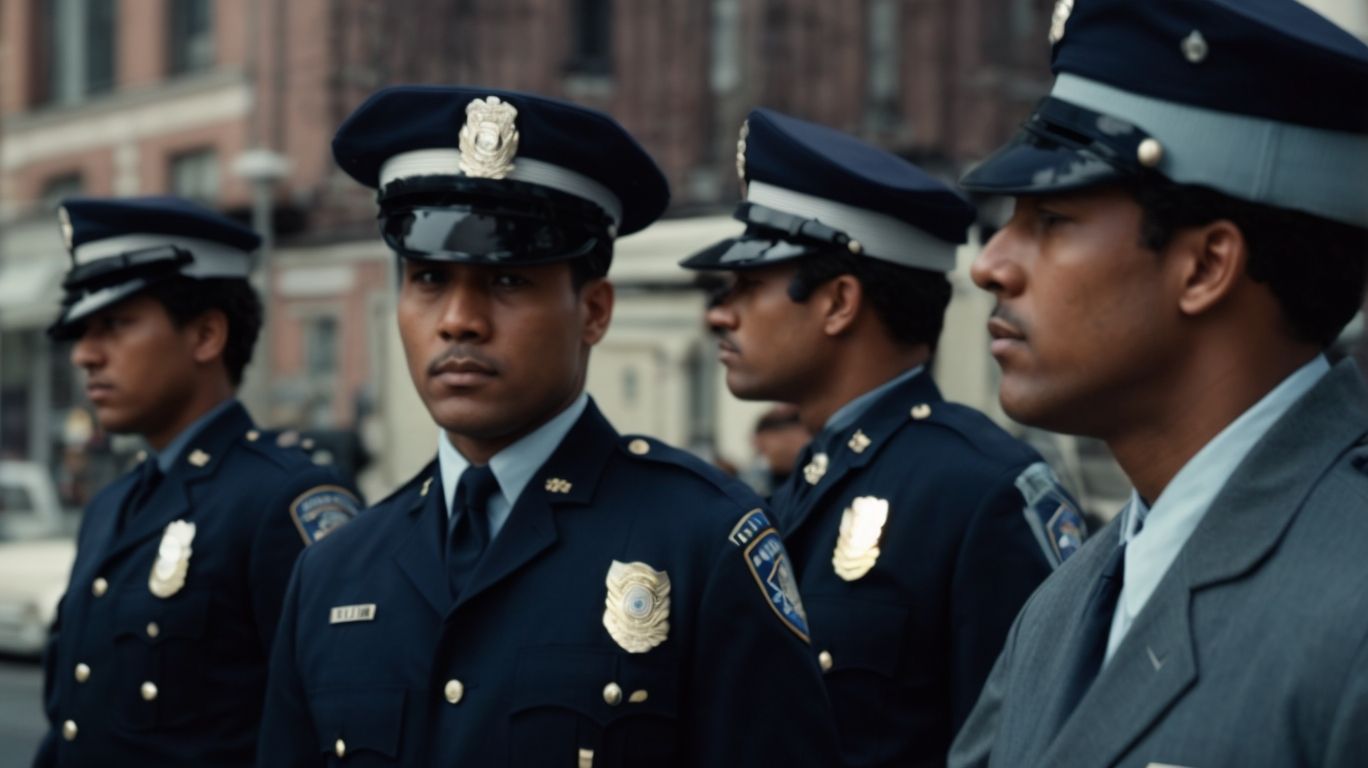Have you ever wondered what goes into the field of police psychology? From pre-employment screening to crisis intervention, the role of a police psychologist is diverse and demanding.
In this article, we will explore the various responsibilities of a police psychologist, including assessing mental fitness for duty and providing support for officers and their families. We will also delve into the common challenges faced by police psychologists, such as managing stress and ethical dilemmas.
Join us as we gain insights into the world of police psychology.
Contents
- 1 Key Takeaways:
- 2 What is Police Psychology?
- 3 What are the Roles of a Police Psychologist?
- 4 What are the Responsibilities of a Police Psychologist?
- 5 What are the Common Challenges Faced by Police Psychologists?
- 6 Frequently Asked Questions
- 6.1 What is police psychology and what are its main roles and responsibilities?
- 6.2 How does police psychology contribute to the well-being of law enforcement officers?
- 6.3 In what ways does police psychology assist with investigations?
- 6.4 How does police psychology help improve the overall effectiveness of law enforcement agencies?
- 6.5 What are some of the challenges faced by police psychologists?
- 6.6 How can individuals pursue a career in police psychology?
Key Takeaways:
- Police psychologists play a crucial role in the law enforcement community, providing mental health support for officers and their families, evaluating incidents such as officer-involved shootings, and developing mental health programs.
- The responsibilities of a police psychologist include assessing mental fitness for duty, managing ethical dilemmas, and addressing mental health stigmas and challenges such as stress and burnout.
- With their unique expertise in both psychology and law enforcement, police psychologists face challenges in balancing confidentiality and safety, as well as addressing stigma and ethical dilemmas in their work.
What is Police Psychology?
Police psychology is a specialized field that involves the application of psychological principles and practices within the context of law enforcement and criminal justice.
Psychology in law enforcement encompasses the study of human behavior, cognition, and emotional responses. This helps to understand and predict the actions of both law enforcement officers and individuals involved in criminal activities.
The impact of psychology in law enforcement is profound. It aids in officer training, crisis intervention, and the development of effective interrogation techniques.
It also plays a crucial role in assessing suspects, witnesses, and victims, contributing to the overall investigation and judicial process within the criminal justice system.
What are the Roles of a Police Psychologist?
Police psychologists fulfill various essential roles, including assessment, clinical intervention, operational support, and organizational consultation, contributing to the professional development and research in the field of law enforcement psychology.
Pre-employment Screening
Pre-employment screening conducted by police psychologists involves the comprehensive assessment of candidates to ensure their psychological suitability for law enforcement roles, contributing to the rigorous selection process adopted by police departments.
Psychological tests, interviews, and background checks are primary assessment methods in the rigorous pre-employment screening process.
Psychological tests, such as the MMPI-2 and the PAI, and structured interviews help evaluate candidates’ emotional stability, decision-making skills, and ethical judgment.
Thorough background checks inquire into candidates’ criminal history and integrity. Police psychologists meticulously analyze these factors to aid in the selection of individuals suited for the demanding nature of law enforcement roles.
Crisis Intervention
Police psychologists play a vital role in crisis intervention, providing essential support and guidance during critical incidents to ensure the well-being of public safety officials and fostering educational initiatives for effective intervention strategies.
Police psychologists are experts in both psychology and law enforcement, allowing them to effectively evaluate and address the emotional and psychological struggles faced by police officers.
Through extensive research and analysis, they provide valuable insights on crisis situations and offer effective communication and de-escalation strategies. Working closely with law enforcement agencies, they help develop thorough crisis intervention protocols to ensure the safety and well-being of all individuals involved.
Training and Consultation
Police psychologists offer valuable training and consultation services to law enforcement professionals, equipping them with the necessary skills and insights to navigate the complex dynamics of their roles within the criminal justice system.
These professionals play a pivotal role in aiding law enforcement officers in their professional development. By providing specialized guidance and counseling, they help individuals in the law enforcement sector to understand and manage the unique challenges they encounter daily.
Police psychologists focus on enhancing the emotional resilience of officers, enabling them to cope with the stress and trauma inherent in their line of work. Through targeted training programs and psychological support, they contribute to the overall well-being and effectiveness of law enforcement personnel.
Counseling and Therapy
Police psychologists offer counseling and therapy services to officers, addressing their mental health needs, mitigating stressors, and enhancing their overall well-being in the challenging law enforcement environment.
Police psychologists play a crucial role in assessing and treating the psychological impact of the demanding nature of police work.
By providing confidential support, they create a safe space for officers to address trauma, anxiety, and other mental health challenges.
They also develop tailored strategies for stress management and resilience-building, equipping officers with the tools to cope effectively with the pressures they face in their roles.
What are the Responsibilities of a Police Psychologist?
The responsibilities of police psychologists encompass assessing mental fitness for duty, evaluating officer-involved shootings, providing support, and contributing to the development of mental health programs within law enforcement agencies.
Assessing Mental Fitness for Duty
Police psychologists are tasked with assessing the mental fitness of law enforcement professionals for their duty, ensuring sound judgment and compliance with the demands of their roles within the criminal justice system.
Thorough assessment involves comprehensive evaluation of an officer’s psychological well-being, including factors such as stress tolerance, decision-making capabilities, ethical standards, and responsiveness in challenging situations.
These evaluations are crucial for identifying any potential psychological barriers that could impede an officer’s ability to perform their duties effectively and professionally.
The process requires a deep understanding of the law enforcement culture and the specific demands imposed by their roles, thereby enabling psychologists to tailor their assessments to suit the unique requirements of the profession.
Evaluating Officer-Involved Shootings
Police psychologists are involved in evaluating the psychological impact of officer-involved shootings, providing insights into the professionals’ mental state and judgment during such critical incidents.
Police psychologists play a crucial role in assessing the psychological well-being of law enforcement officers involved in shooting incidents.
Through analyzing cognitive processes and behavioral responses, they provide professional insights that aid in determining the appropriateness of the officers’ actions.
These assessments also shed light on the effects of stress and pressure on decision-making, helping to understand the factors that may influence an officer’s judgment in high-stakes situations.
Providing Support for Officers and their Families
Police psychologists offer crucial support to officers and their families, addressing stressors, enhancing morale, and facilitating compensation processes to ensure their well-being in the demanding law enforcement environment.
This support extends to providing counseling services to help officers cope with the psychological impact of their work. These services offer strategies for managing high-pressure situations and assist in maintaining a healthy work-life balance.
Police psychologists play a pivotal role in bolstering the morale of law enforcement teams. They implement programs to promote mental wellness, resilience, and camaraderie among officers.
Developing and Implementing Mental Health Programs
Police psychologists play a pivotal role in developing and implementing mental health programs within law enforcement agencies, contributing to the formulation of policies, procedures, and educational initiatives to enhance officer well-being.
By leveraging their expertise in psychology, police psychologists contribute to the creation of mental health guidelines and protocols that align with the unique challenges faced by law enforcement personnel.
They collaborate with agency leaders to integrate mental health considerations into operational policies, striving to ensure that officers receive the support they require.
They actively participate in the design and delivery of educational programs, equipping personnel with the knowledge and tools to recognize and address mental health issues effectively.
What are the Common Challenges Faced by Police Psychologists?
Police psychologists encounter common challenges related to balancing confidentiality and safety, addressing stigma and mental health stigmas, managing stress and burnout, and navigating ethical dilemmas within the law enforcement environment.
Balancing Confidentiality and Safety
Police psychologists encounter the challenge of balancing confidentiality and safety in their interactions within law enforcement settings, navigating the implementation of policies and procedures to address this delicate dynamic.
This difficult balancing act stems from the need to maintain the privacy and trust of individuals seeking psychological support while also ensuring the safety and security of law enforcement personnel and the general public.
The ethical considerations in handling sensitive information, especially in the context of criminal investigations and high-stress environments, add another layer of complexity to the role of police psychologists.
Addressing Stigma and Mental Health Stigmas
Police psychologists strive to address the pervasive stigma and mental health stigmas within the law enforcement context, working to foster education, reshape social norms, and influence perceptions within the court system.
This involves implementing educational initiatives aimed at improving understanding and awareness of mental health issues among law enforcement personnel, as well as providing them with effective coping strategies and resources to manage their mental well-being.
These psychologists are actively engaged in reshaping the social norms within the law enforcement community, challenging negative attitudes, and promoting a culture of support and openness towards mental health concerns.
Their influence extends to the court system, where they provide expert testimony and guidance to ensure that mental health considerations are appropriately factored into legal proceedings, thereby contributing to fairer and more informed judicial outcomes.
Managing Stress and Burnout
Police psychologists grapple with the challenge of managing stress and burnout in the demanding law enforcement environment, focusing on the well-being of officers, facilitating compensation, and promoting mental health support.
The demanding nature of police work can take a toll on officers, and police psychologists play a crucial role in addressing the psychological impact of their experiences.
Apart from the external pressures, the inherent trauma and intense situations officers encounter can lead to accumulated stress and potential burnout. With a holistic approach, psychologists aim to assess, prevent, and intervene in the psychological struggles faced by officers.
They strive to enhance compensation facilitation and mental health support provisions, ensuring the overall well-being of the law enforcement personnel.
Dealing with Ethical Dilemmas
Police psychologists encounter ethical dilemmas in their practice, navigating complex cases and decisions that require sound judgment, compliance, and professional considerations within the law enforcement domain.
One of the key areas where ethical dilemmas arise for police psychologists is in relation to confidentiality.
While they are bound by ethical standards to maintain client confidentiality, they may also be faced with situations where disclosing information to law enforcement could potentially prevent harm to individuals or the community.
Navigating this fine line requires a delicate balance of professional judgment and compliance with legal and ethical obligations.
Frequently Asked Questions
What is police psychology and what are its main roles and responsibilities?
Police psychology is a specialized field that focuses on the application of psychological principles and practices within law enforcement. Its main roles and responsibilities include providing counseling and support to officers, evaluating potential recruits, conducting crisis interventions, and assisting with investigations.
How does police psychology contribute to the well-being of law enforcement officers?
Police psychology plays a crucial role in promoting the mental health and well-being of law enforcement officers. By providing support and counseling services, it helps officers cope with the stress and trauma of their job, prevent burnout, and improve their overall quality of life.
In what ways does police psychology assist with investigations?
Police psychologists can assist with investigations by conducting psychological evaluations of suspects, victims, and witnesses. They can also provide insights into the behavior and motives of individuals involved in a case, as well as assist with developing strategies for effective interrogation and interviewing techniques.
How does police psychology help improve the overall effectiveness of law enforcement agencies?
By integrating psychological principles and practices into law enforcement, police psychology can help improve the effectiveness of police departments. It can enhance training programs, promote better communication and conflict resolution, and increase understanding and empathy between officers and the communities they serve.
What are some of the challenges faced by police psychologists?
Police psychologists face several challenges in their role, including dealing with high levels of stress and trauma, balancing their role as both an advocate for officers and the community, and navigating ethical dilemmas. They must also keep up with the ever-changing landscape of law enforcement and adapt their practices accordingly.
How can individuals pursue a career in police psychology?
Individuals interested in pursuing a career in police psychology can typically start by obtaining a degree in psychology or a related field. They will then need to complete additional training and certification specific to police psychology. Many also gain experience by working with law enforcement agencies or in related fields before specializing in police psychology.




